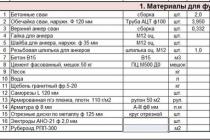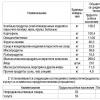"dated November 21, 1996 and in accordance with the Accounting Regulations" Accounting policy enterprises” PBU 1/2008 (approved by order of the Ministry of Finance of the Russian Federation dated 01.01.2001 No. 000n).
1.2. The accounting policy of an NP is a set of methods of conducting accounting- primary observation value measurement, the current grouping and the final generalization of the facts of the statutory activities.
1.3. The USN regime applies to accounting and reporting of NP.
2. Organization of accounting in NP:
2.1. Responsibility for the organization of accounting in NP and compliance with the law when performing business transactions carried by the Director General.
2.2. Accounting is carried out Chief Accountant.
2.3. Timely provision of complete and reliable reporting carried out by the Chief Accountant.
2.4. The Chief Accountant is appointed and dismissed by the General Director and reports directly to him.
2.5. In case of disagreement between the General Director and the Chief Accountant on the implementation of certain business transactions, documents on them can be accepted for execution from a written order Director General which bears full responsibility for the consequences of such operations.
3. The following persons have the right to sign primary accounting documents:
When changing financially responsible persons;
When revealing facts of theft, abuse or damage to property;
When natural disaster, fire or other emergencies;
In case of reorganization or liquidation of NP.
4.4 The inventory is carried out by a permanent inventory commission, its composition is determined by the order of the General Director.
5. Estimation of property and liabilities of NP:
5.1 The valuation of the property and liabilities of an IR is carried out in amounts rounded to the nearest ruble.
7.1. Low-value assets that meet the criteria of fixed assets should be reflected in accounting and financial statements in accordance with applicable law as part of financial production stocks;
7.2. The value limit, within which low-value assets are recognized as inventories, is set at a cost of no more than 20,000 rubles;
7.3. The change in the value of fixed assets, at which they were accepted for accounting, should be made without revaluation on a voluntary basis;
7.4. The formation of the residual value of fixed assets, upon disposal, is carried out on a separate sub-account of account 01.
7.5. For objects of fixed assets, depreciation shall not be accrued in accordance with the current legislation.
Summarizing information on the amounts of depreciation accrued linear way to be carried out using off-balance account 010 “Depreciation of fixed assets”.
Term beneficial use determine based on the expected period of use of the object, its physical deterioration.
8. NP reporting:
8.1. The reporting period is the period from January 1 to December 31 of the year.
8.2. The reporting of the NP is approved in the manner prescribed by the charter in the following terms:
for annual accounts- within 90 days after the end of the year,
9.Norms for some expenses:
Daily allowance 500 rubles. in a day;
Accommodation and rent of premises at actual costs, but not more than 1500 rubles. per day.
9.2. Hospitality expenses are made in accordance with the approved estimate of income and expenses.
10. Control over business transactions:
10.1. Current and operational control over business operations is carried out by the Chief Accountant and the General Director.
10.2. Checking the accounting and reporting of the NP is carried out in accordance with the law and the Charter of the NP.
10.3. Control of accounting and reporting of NP is carried out during the annual audit.
11. Final provisions:
11.1. Changes to this provision and their entry into force occur in accordance with the law.
11.2. Additions to the annexes to this Regulation may be made by orders of the General Director.
11.3. Changes and additions to this Regulation may also be made to eliminate errors and omissions.
The organization of accounting in a company should begin with the definition of a taxation system. This choice affects not only the size tax liabilities and frequency of reporting, but also the procedure for making payments to the budget. Features of interaction with the Federal tax service and budgets should be fixed in a special document.
How to compose for OSNO
At common system in the accounting policy for tax purposes, it is necessary to paint:
- The method of accounting for income when calculating income tax (cash or accrual method).
- Method for determining the value of fixed assets, inventories and goods.
- Depreciation method for fixed assets and intangible assets.
- The possibility of forming reserves for income tax, vacations and doubtful debts.
- Forms and forms tax registers: unified or developed independently.
Regional and local authorities have the right to establish reduced tax rates, approve additional benefits or completely exempt from payment. When compiling, be guided not only by federal legislation, but also by the regulatory legal acts of subjects and municipalities.
How to compose with simplification
The simplified taxation system, according to the rules of the current legislation, provides for two types of accounting for enterprise income:
- "income" - the tax base is the total income for the reporting period, excluding expenses incurred;
- "income minus expenses" - the basis for calculating the liability is determined as the difference between total receipts and expenses.
Consider distinctive features in the table:
|
Index |
"Income" |
"Income minus expenses" |
|---|---|---|
|
Object of taxation |
If the accounting policy of NPOs on the simplified tax system (as well as for commercial enterprises) assumes the object of taxation "income", then when determining the payment, the organization takes into account only the receipt of funds. |
We prescribe "d - r", that is, when calculating obligations, we take into account the receipts of funds reduced by expenses. |
|
If the institution next reporting period plans to change the object of NO, then a notification to the Federal Tax Service is sent no later than December 30 current year(clause 2 of article 346.14 of the Tax Code of the Russian Federation). |
||
|
tax rate |
It is not necessary to specify, since the rate is the same for this type of taxation - 6%. |
The rate is 15% for all taxpayers. |
|
The condition is relevant only if the regional authorities have reduced the tax rate. Otherwise, it is not necessary to indicate the size of the rate in the UE (clauses 1 and 2 of article 346.20 of the Tax Code of the Russian Federation). |
||
|
Income and expense ledger |
If the institution has chosen electronic record keeping, determine the order of printing, numbering, stapling of pages and their certification. Also fix the person responsible for storing the document. |
|
|
Cost accounting |
Not applicable. |
Companies on the simplified tax system are eligible to reduce the income of this reporting period for losses of previous years (clause 7 of article 346.18 of the Tax Code of the Russian Federation). You can use the condition if the company in the unprofitable period was on the simplified tax system "d - r". Minimum tax. The Company has the right to take into account as expenses the difference between the listed minimum tax and the tax calculated in in the usual way. Such conditions are spelled out in paragraph 6 of Art. 346.18 of the Tax Code of the Russian Federation. |
"Accounting in budgetary and non-profit organizations", 2013, N 8
The formation of the accounting policy of an economic entity is one of the main difficult questions accounting organizations, including commercial organizations(NPO).
AT modern conditions reforming Russian legislation there is a sufficient and complete legal framework that determines the existence of NCOs, including the procedure for their registration, activities and liquidation. Nonetheless regulation NPO accounting is imperfect. This issue has been raised for a long time. So, N.T. Labyntsev and L.V. Egorova wrote that all accounting provisions were developed only for commercial organizations and are almost completely unsuitable for NGOs. According to the authors, this statement is not entirely true.
At present, the accountant of an NPO, when forming an accounting policy, should focus on the following documents:
- Federal Law No. 402-FZ of 06.12.2011 "On Accounting" (hereinafter referred to as the Accounting Law);
- Regulation on accounting and financial reporting in Russian Federation(approved by Order of the Ministry of Finance of Russia dated July 29, 1998 N 34n);
- Regulation on accounting "Accounting policy of the organization" (PBU 1/2008) (approved by Order of the Ministry of Finance of Russia dated 06.10.2008 N 106n);
- international standard financial reporting(IAS) 8 "Accounting Policies, Changes in Accounting Estimates and Errors" (approved by Order of the Ministry of Finance of Russia dated November 25, 2011 N 160n).
At the same time, it must be remembered that the Regulation on accounting and financial statements in the Russian Federation, PBU 1/2008 and IAS 8 are intended to a greater extent for the formation of accounting policies for commercial organizations.
In accordance with paragraph 1 of Art. 8 of the Law on Accounting, the totality of methods of conducting accounting by an economic entity constitutes its accounting policy.
The Regulation on accounting and financial reporting in the Russian Federation does not contain a definition of accounting policy, but there is a mention of it.
International Financial Reporting Standard (IAS) 8 interprets accounting policies as the specific principles, bases, conventions, rules and practices adopted by an entity for the preparation and presentation of financial statements.
According to clause 2 PBU 1/2008 under accounting policy organization is understood as the set of accounting methods adopted by it:
- primary observation;
- cost measurement;
- current grouping;
- final summary of facts economic activity.
In table. 1 presents an analysis of the concept of "accounting policy of an organization" in regulatory documents, conducted by T.Yu. Druzhilovskaya and T.N. Korshunova.
Table 1
Definition of the concept of "accounting policy" in Russian accounting standards
| N p/p | Name normative document | Concept definition "accounting policy" |
| 1 | Federal Law of 06.12.2011 N 402-FZ "About accounting" | Defines the concept of "accounting does not disclose economic content methods |
| 2 | Rule of conduct accounting and | Does not contain a definition of the concept "accounting policy", but includes list of aspects that must be approved upon acceptance accounting policy |
| 3 | PBU 1/2008 "Accounting policy organizations" | Defines the concept of "accounting politics" through the concept of "methods bookkeeping, but list of disclosed methods is not exhaustive and different from the list of Regulations for accounting and financial statements in the Russian Federation |
| 4 | PBU 4/99 "Accounting statements organization", PBU 5/01 "Accounting material and production reserves", PBU 6/01 "Accounting for the main funds", PBU 9/99 "Income organization", PBU 10/99 "Expenses organization", PBU 14/2007 "Accounting intangible assets", PBU 18/02 "Accounting for tax payments on the profit of organizations", RAS 19/02 "Accounting financial investments", PBU 21/2008 "Changes in estimated values", RAS 22/2010 "Error correction in accounting and reporting", PBU 23/2011 "Report about the movement Money" | Includes the concept of "accounting politics", but do not bring it definitions |
As noted by T.Yu. Druzhilovskaya and T.N. Korshunova, The Regulation on accounting and financial reporting in the Russian Federation includes a list of methods that must be approved when an organization adopts an accounting policy:
- a working chart of accounts of accounting, containing the accounts used in the organization, necessary for maintaining synthetic and analytical accounting;
- forms of primary accounting documents used for registration of business transactions, for which standard forms primary accounting documents, as well as forms of documents for internal financial statements;
- assessment methods certain types property and liabilities;
- the procedure for conducting an inventory of property and liabilities;
- the procedure for monitoring business transactions, as well as other decisions necessary for the organization of accounting.
The accounting methods in PBU 1/2008 include the following methods:
- grouping and evaluation of the facts of economic activity;
- redemption of the value of assets;
- organization of document circulation;
- inventory;
- application of accounting accounts;
- organization of accounting registers;
- information processing.
Thus, in contrast to the Law on Accounting, PBU 1/2008 not only defines the concept of "accounting policy" through the concept of "accounting methods", but also discloses these methods themselves. Comparing the list of accounting methods given in PBU 1/2008 with the list that must be approved when forming an accounting policy in accordance with the Regulations on Accounting and Accounting in the Russian Federation, one cannot help but admit that these lists do not match. When evaluating both lists, it should be noted that neither one nor the other covers all aspects of accounting that should be included in an accounting policy.
International Financial Reporting Standard (IAS) 8 does not disclose the content of the principles, bases, agreements, rules and practices that should be reflected in the accounting policy. However, paragraph 7 of IAS 8 regulates that "when a particular IFRS is applied to a transaction, other event or condition, the accounting policy or its provisions applicable to this article shall be determined by applying this IFRS" .
Thus, when forming the accounting policy of an economic entity, including NCOs, the person responsible for its formation should proceed from his professional judgment and vision of the foundations of non-commercial activities. So, according to the authors, the following statement by N.T. Labyntsev and L.V. Egorova: "The accounting methods chosen by the accountant of a non-profit organization must comply with generally accepted rules and reflect the statutory and entrepreneurial activities of organizations as accurately as possible, providing complete, objective and reliable information about their activities" .
Currently in economic literature proposed by various authors a large number of variety of accounting policy options economic entities including NGOs. It should be noted that there is still no single methodology, therefore, each economic entity is free to independently develop provisions included in the accounting policy of the organization.
In addition, there is no unambiguous understanding of what accounting policy is for an economic entity. One legal document or a set of documents combined under the general name "accounting policy of an economic entity", i.e. a set of internal accounting standards for an economic entity? In our opinion, an accounting policy is a set of internal accounting standards, in which the ways and methods of accounting are considered and substantiated in detail.
However, applying the principle of parsimony to the formation of accounting policy, it should be noted that for economic entities of small size (criteria for classifying economic entities as entities of small size are not defined in this article, since this requires further research), the development of several regulatory documents may be unfounded. Therefore, for such entities, accounting policies can be represented solely by one document, as is done in the practice of most organizations, including NPOs. In the future, both for one document and for a set of documents that determine the accounting methods chosen by the NCO, we will use the concept of "accounting policy".
The accounting policy of an NPO is approved by order (instruction) of the head of the organization, while the following sections are approved:
- a working chart of accounts of accounting containing synthetic and analytical accounts necessary for accounting;
- forms of primary accounting documents, accounting registers, as well as documents for internal accounting reporting;
- the procedure for conducting an inventory of the assets and liabilities of the organization;
- methods of valuation of assets and liabilities;
- document flow rules and accounting information processing technology;
- the procedure for monitoring business transactions;
- other solutions necessary for the organization of accounting.
The sequence of presentation of these sections is established by the NCO independently based on the logical presentation of the normative document (documents) and professional opinion the person responsible for drawing up the accounting policy.
Noteworthy is the sequence of drawing up an accounting policy, which is set out by N.T. Labyntsev and L.V. Egorova, who made an attempt to create their own methodology, based on the results of the work of other economists. This technique is given in table. 2 (subject to our author's processing in accordance with currently valid legislative and regulatory documents).
table 2
Methodology for compiling the accounting policy of a non-profit organization
| N p/p | Component part of accounting politicians | Content |
| 1 | Organizational part | general information about the organization, including an indication its form, type and purpose of statutory activities, the presence structural divisions and subsidiaries. Organization management structure. The mechanism for monitoring the results of its statutory activities. The method of distribution of indirect costs. Sources of financing. Income structure. Cost structure. Activity evaluation. Policy changes |
| 2 | Part, defining accounting standards non-profit organizations | Working chart of accounts. Forms of primary accounting documents. Separate accounting methodology. The procedure for conducting an inventory of assets and obligations. Methods for assessing assets and liabilities. Document management rules. The order of control over economic operations. The procedure for accounting for fixed assets and intangible assets. Methods of depreciation of fixed assets and intangible assets. Sales accounting. Accounting for services rendered within the framework of statutory activities. Payroll accounting. Calculations with accountable persons. Norms travel expenses. Doing cash transactions. Accounting banking operations. Accounting for membership, introductory, sponsorship fees and others earmarked funds. Accounting for donations (anonymous and personal). Directions of profit distribution. Accounting for business income and expenses. Cost calculation. Other Solutions Your Organization Needs accounting |
| 3 | Part, defining accounting for purposes taxation non-profit organizations | The procedure for the formation of amounts of income and expenses. The procedure for determining the share of expenses in current period. The procedure for creating reserves. Amounts owed to the budget for income tax organizations. List of persons responsible for maintaining tax accounting, for its organization, for the schedule workflow. Forms primary documents. Registers tax accounting |
The presented methodology quite fully reflects the specifics of the formation of the accounting policy of NCOs and can be successfully applied by them.
When forming the accounting policy of an NCO, it must be taken into account that certain accounting provisions may not be applied for the purposes of accounting. In table. 3 presents a description of the possibility of applying the provisions on accounting in NCOs.
Table 3
Characteristics of the application of accounting provisions in non-profit organizations
| N p/p | Name provisions for accounting accounting | Possibility applications | Item Feature |
| 1 | PBU 1/2008 "Accounting policy organizations" | It is applied for accounting politicians non-commercial organizations | Clause 3. Distributed in terms of accounting policies for all types organizations |
| 2 | PBU 2/2008 "Accounting contracts construction contract" | In accounting policy socially oriented non-profit organizations needs to be fixed possibility applications (non-application) given PBU | Clause 2.1. The position may do not apply to subjects small business, except for issuers publicly placed securities papers, as well as socially oriented non-commercial organizations |
| 3 | PBU 3/2006 "Accounting assets and obligations, the cost of which expressed in foreign currency" | Does not contain restrictions on applications non-commercial organizations | - |
| 4 | PBU 4/99 "Accounting reporting organizations" | It is applied for formation accounting (financial) reporting non-commercial organizations | Clause 3. Regulation applied by the Ministry of Finance of Russia when establishing a simplified order of formation financial statements for subjects of small entrepreneurship and non-profit organizations |
| 5 | PBU 5/01 "Accounting financial production reserves" | Does not contain restrictions on applications non-commercial organizations | - |
| 6 | PBU 6/01 "Accounting fixed assets" | Provided application specifics PBU in non-commercial organizations | Clause 4. Non-commercial the organization accepts the object to accounting as fixed assets if it is intended for use in activities aimed to achieve the goals of creating this non-profit organizations (including in entrepreneurial activities carried out according with the legislation of the Russian Federation), for management needs non-profit organization, and also if performed conditions set in pp. "b" and "c" of the present paragraph (paragraph "b" - object created for use during long time, i.e. term lasting over 12 months or ordinary operating cycle, if it exceeds 12 months, pp. "in" - organization does not imply subsequent resale of this object). Item 17. By objects fixed assets non-profit organizations depreciation is not charged. For them on an off-balance account generalization information about the amount of depreciation, accrued by linear way |
| 7 | PBU 7/98 "Events after the reporting dates" | Not applicable non-commercial organizations | Paragraph 1. PBU establishes reflection order in financial statements commercial organizations (except credit organizations) that are legal entities according to the legislation of the Russian Federation, events after the reporting date |
| 8 | RAS 8/2010 "Estimated obligations, conditional obligations and contingent assets" | In accounting policy socially oriented non-profit organizations needs to be fixed possibility applications (non-application) given PBU | Paragraph 3. PBU may not applied by subjects small business, with the exception of subjects small business - issuers publicly hosted valuable papers, a also socially oriented non-commercial organizations |
| 9 | PBU 9/99 "Income organizations" | Applies to parts "entrepreneurial activities and other activities" that needs to be reflected in the accounting policy including transactions related to "entrepreneurial activities and other activities" | Clause 1. With regard to PBU non-profit organizations (except state (municipal) institutions) recognize income from entrepreneurial and other activities |
| 10 | PBU 10/99 "Expenses organizations" | Applies to parts "entrepreneurial activities and other activities" that needs to be reflected in the accounting policy including transactions related to "entrepreneurial activities and other activities" | Clause 1. With regard to PBU non-profit organizations (except state (municipal) institutions) recognize expenses for entrepreneurial and other activities |
| 11 | PBU 11/2008 "Information about related sides" | Not applicable non-commercial organizations | Paragraph 1. PBU establishes disclosure procedure about related parties in financial statements commercial organizations, except for credit organizations (organizations, accounting reporting) |
| 12 | RAS 12/2010 "Information by segments" | Not applicable non-commercial organizations | Paragraph 1. PBU establishes rules for the formation and submission of information by segments in accounting commercial organizations (except credit organizations) that are legal entities according to the legislation of the Russian Federation |
| 13 | PBU 13/2000 "Accounting state help" | Not applicable non-commercial organizations | Paragraph 1. PBU establishes formation rules in accounting receipt information and use state aid, provided by commercial organizations (except credit organizations), legal persons under the law RF, and recognized as increase in economic specific organizations as a result receipt of assets (cash, other property) |
| 14 | PBU 14/2007 "Accounting intangible assets" | Does not contain restrictions on applications non-commercial organizations | - |
| 15 | PBU 15/2008 "Accounting borrowing costs and loans" | Does not contain restrictions on applications non-commercial organizations | - |
| 16 | PBU 16/02 "Information on a discontinued activities" | Not applicable non-commercial organizations | Paragraph 1. PBU establishes disclosure procedure for discontinued operations in financial statements commercial organizations (except credit organizations) that are legal entities according to the legislation of the Russian Federation |
| 17 | PBU 17/02 "Accounting expenses on scientific research, experimental design and technological work" | Not applicable non-commercial organizations | Clause 1. Regulation sets the rules formation in accounting and financial statements commercial organizations, legal persons under the law Russian Federation (excluding credit organizations), information about the costs associated with the implementation research, development and technological works |
| 18 | PBU 18/02 "Accounting tax calculations at a profit organizations" | In accounting policy non-commercial organizations needs to be fixed possibility applications (non-application) of this PBU, in case if the organization is a payer income tax organizations | Clause 2. The provision may do not apply to subjects small business and non-commercial organizations |
| 19 | PBU 19/02 "Accounting financial investments" | Does not contain restrictions on applications non-commercial organizations | - |
| 20 | PBU 20/03 "Information on participation in a joint activities" | Not applicable non-commercial organizations | Clause 1. Regulation sets the rules and disclosure procedure on participation in a joint activities in accounting commercial organizations (except credit organizations) that are legal entities according to the legislation of the Russian Federation |
| 21 | PBU 21/2008 "Changes appraisal values" | Does not contain restrictions on applications non-commercial organizations | - |
| 22 | PBU 22/2010 "Correction mistakes in accounting accounting and reporting" | Does not contain restrictions on applications non-commercial organizations | - |
| 23 | RAS 23/2011 "Report about the movement Money" | Does not contain restrictions on applications non-commercial organizations, however forms of accounting reporting socially oriented non-commercial organizations not contain this form reporting | - |
| 24 | PBU 24/2011 "Accounting development costs natural resources" | Does not contain restrictions on applications non-commercial organizations | - |
Separate paragraphs of the accounting regulations intended for commercial organizations, if the latter do not contradict the specifics of the activities of the non-profit sector, can be used in the NPO's accounting policy and must be spelled out in it. In addition, the accounting policy of an NCO should contain a section that reflects the procedure for accounting for the facts of economic activity in terms of entrepreneurial activity. At the same time, the principles of accounting for the facts of entrepreneurial activity of NPOs must comply with the requirements for accounting in the commercial sector of the economy. These requirements are formed by NCOs independently.
In our opinion, in addition to the specifics of NPO activities, the following factors influence the choice and justification of accounting policies:
- organizational and legal form;
- types and scope of the organization's activities;
- development strategy ( long term prospects organization development, etc.);
- level of material base and information support(availability and level of computer equipment and office equipment, software, databases, etc.);
- the scale of the management structure of the organization (in general) and accounting (in particular);
- the level of qualification of the management of the organization, accounting and economic personnel.
For NGOs, the organization of separate accounting of expenses and incomes is of particular importance. Under separate accounting income and expenses is understood as separate accounting for the formation of sources of financing for current activities and the formation of income from entrepreneurial activities of NPOs and expenses associated with their entrepreneurial activities.
Accounting for targeted income and expenses is one of the most controversial and complex issues in accounting for NCOs. Many questions and disputes also arise when accounting for operations on the use of targeted financing. No provisions have been developed on this issue. As L.V. Gusarov, there have been repeated attempts to create standards for NGOs. In this regard, it should be noted that it is possible to implement any recommendations of this section of accounting only in the accounting policy of NCOs, taking into account the specifics of the developments of leading economists and scientists. This area (object) of NCO accounting requires further development.
To form a section for accounting for income and expenses for entrepreneurial activity, in our opinion, it is necessary to be guided by PBU 9/99 "Income of the organization" and PBU 10/99 "Expenses of the organization". L.V. adheres to a similar position. Gusarova.
Proper separation of accounting in the accounting policy will allow the formation of reliable information both for the purposes of compiling accounting (financial) statements and for taxation purposes.
Thus, the accounting policy for NCOs should be a set of principles, methods, methods, accounting techniques, which may vary, reflecting the specifics of the activities of a particular NCO. The formation of the accounting policy of an NPO has its own specifics, since, along with the main non-commercial activity, it also includes commercial (entrepreneurial, income-generating activities). All this should be correctly disclosed in the NPO's accounting policy, taking into account the principle of professional competence.
Bibliography
- Gusarova L.V. Target financing and targeted revenues: accounting methodology // Accounting in budgetary and non-profit organizations. 2011. No. 20.
- Druzhilovskaya T.Yu., Korshunova T.N. Conceptual Foundations formation of accounting policy in the systems of Russian and international standards// International accounting. 2012. No. 46.
- Labyntsev N.T., Egorova L.V. Problems of accounting policy formation for non-profit organizations // Accounting in budgetary and non-profit organizations. 2007. No. 7.
- International Financial Reporting Standard (IAS) 8 "Accounting policies, changes in accounting estimates and errors": Order of the Ministry of Finance of Russia dated November 25, 2011 N 160n.
- On accounting: Federal Law of December 6, 2012 N 402-FZ.
- On the approval of the Accounting Regulations "Accounting Statements of the Organization" (PBU 4/99): Order of the Ministry of Finance of Russia dated 06.07.1999 N 43n.
- On the approval of the Regulations on accounting "Income of the organization" (PBU 9/99): Order of the Ministry of Finance of Russia dated 06.05.1999 N 32n.
- On approval of the Accounting Regulation "Change estimated values"(PBU 21/2008): Order of the Ministry of Finance of Russia dated 06.10.2008 N 106n.
- On Approval of the Regulations on Accounting "Information on Related Parties" (PBU 11/2008): Order of the Ministry of Finance of Russia dated April 29, 2008 N 48n.
- On approval of the Accounting Regulation "Information on participation in joint activities"(PBU 20/03): Order of the Ministry of Finance of Russia dated November 24, 2003 N 105n.
- On approval of the Regulations on accounting "Information on discontinued activities" (PBU 16/02): Order of the Ministry of Finance of Russia dated 02.07.2002 N 66n.
- On approval of the Accounting Regulations "Information by Segments" (PBU 12/2010): Order of the Ministry of Finance of Russia dated 08.11.2010 N 143n.
- On approval of the Accounting Regulation "Correction of errors in accounting and reporting" (PBU 22/2010): Order of the Ministry of Finance of Russia dated 06.28.2010 N 63n.
- On approval of the Accounting Regulations "Cash Flow Statement" (PBU 23/2011): Order of the Ministry of Finance of Russia dated 02.02.2011 N 11n.
- On approval of the Accounting Regulations " Estimated liabilities, contingent liabilities and contingent assets" (PBU 8/2010): Order of the Ministry of Finance of Russia dated December 13, 2010 N 167n.
- On approval of the Accounting Regulation "Expenses of the organization" (PBU 10/99): Order of the Ministry of Finance of Russia dated 06.05.1999 N 33n.
- On approval of the Accounting Regulation "Events after the reporting date" (PBU 7/98): Order of the Ministry of Finance of Russia dated November 25, 1998 N 56n.
- On approval of the Accounting Regulation "Accounting for assets and liabilities, the value of which is expressed in foreign currency"(PBU 3/2006): Order of the Ministry of Finance of Russia dated November 27, 2006 N 154n.
- On approval of the Accounting Regulations "Accounting for State Assistance" (PBU 13/2000): Order of the Ministry of Finance of Russia dated October 16, 2000 N 92n.
- On approval of the Accounting Regulation "Accounting for contracts building contract"(PBU 2/2008): Order of the Ministry of Finance of Russia dated 10.24.2008 N 116n.
- On Approval of the Regulations on Accounting "Accounting for Development Costs natural resources"(PBU 24/2011): Order of the Ministry of Finance of Russia dated 06.10.2011 N 125n.
- On approval of the Accounting Regulations "Accounting for inventories" (PBU 5/01): Order of the Ministry of Finance of Russia dated 09.06.2001 N 44n.
- On approval of the Accounting Regulation "Accounting for Intangible Assets" (PBU 14/2007): Order of the Ministry of Finance of Russia dated December 27, 2007 N 153n.
- On approval of the Accounting Regulation "Accounting for Fixed Assets" (PBU 6/01): Order of the Ministry of Finance of Russia dated 30.03.2001 N 26n.
- On approval of the Accounting Regulation "Accounting for corporate income tax settlements" (PBU 18/02): Order of the Ministry of Finance of Russia dated November 19, 2002 N 114n.
- On the approval of the Accounting Regulations "Accounting for the costs of research, development and technological work" (PBU 17/02): Order of the Ministry of Finance of Russia dated November 19, 2002 N 115n.
- On approval of the Accounting Regulation "Accounting for expenses on loans and credits" (PBU 15/2008): Order of the Ministry of Finance of Russia dated 06.10.2008 N 107n.
- On approval of the Accounting Regulation "Accounting for financial investments" (PBU 19/02): Order of the Ministry of Finance of Russia dated 10.12.2002 N 126n.
- On approval of accounting regulations: Order of the Ministry of Finance of Russia dated 06.10.2008 N 106n.
- On approval of the Regulations on accounting and financial reporting in the Russian Federation: Order of the Ministry of Finance of Russia dated July 29, 1998 N 34n.
- Trushitsyna A.Yu. Formation, change and disclosure of accounting policy // Accounting in budgetary and non-profit organizations. 2012. No. 7.
O.V. Kotlyachkov
departments of accounting,
finance and audit
Izhevsk State
agricultural Academy
N.V. Kotlyachkova
departments of international
economic relations and law
Udmurt State University
N.L.Denisova
Chief Accountant
Non-profit partnership
"Udmurt Territorial
institute of professional accountants"
federal law No. 129-FZ obliges any company, regardless of its organizational and legal status, to conduct Accounts. How does the accounting policy of a non-profit organization help to avoid controversial situations with the financial report of 2017, we understand below.
Terminology
An NPO is an organization focused not on making a profit, but on achieving a disinterested social and public goal. The following types of objects belong to it (Article 2 of Federal Law No. 7-FZ):
- public or religious associations.
- Communities of indigenous peoples of the Russian Federation.
- Cossack societies.
- non-profit partnerships.
- Associations and unions.
- Charitable and social funds.
Achieving the goal of NCOs is impossible without a well-designed accounting policy. This term refers to such methods and methods of accounting, which, in the opinion of management, correspond to the conditions for the functioning of a non-profit organization and are best responsible for controlling its financial position.
General provisions
The accounting policy of commercial organizations is drawn up in accordance with the Order of the Ministry of Finance of the Russian Federation No. 106n, and difficulties with financial statements practically does not happen. But in relation to NPOs, the law does not provide for any normative document that adequately sets out the procedure for maintaining records. Therefore, in practice, many employees, referring to various provisions of the Federal Law "On Accounting", resolve controversial issues on their own.
So, according to Art. 6 of the Order of the Ministry of Finance of the Russian Federation No. 106n, the responsibility for the availability and maintenance of accounting lies entirely with the head. He must not only determine a rational system for organizing business operations, but also check its reflection in the financial report in a timely manner, even though such functions are the responsibility of the chief accountant.
The NPO's accounting policy allows accounting without the use of double entry and requires the solution of the following issues (Article 4 of the Order of the Ministry of Finance of the Russian Federation No. 106n):
- Availability of a working chart of accounts.
- Document circulation rules and methods of information processing.
- Requirements for conducting an inventory of assets and liabilities of NPOs, as well as methods for their assessment.
- The order of control over economic operations.
- Forms of primary documents and registers.
The accounting policy is applied from the beginning of the new reporting year. For NPOs that have existed for more than a year, but need changes and additions to their accounting policies, it is enough to make adjustments before this period. In the case of an NCO, it draws up the chosen system of accounting policies no later than 90 days from the date of state registration of the legal entity.
The accounting policy is applied from the beginning of the new reporting year.
As for the financial report, it is better for NPOs to divide property accounting into synthetic and analytical, identifying a separate source of funding for each: or income from entrepreneurial activity. Also in the accounting policy of NPOs should be spelled out:
- Methods of accrual and write-off of funds.
- Types of property and the procedure for control over it.
- The cost limit for classifying property as fixed assets.
- Reserves for repairs (if necessary).
- List of rendered paid services determining their cost.
- General running costs.
- Stock valuation.
- Tax policy.
Since the accounting policy of an NPO is a fundamental criterion for the existence of a non-profit organization, it is necessary to approach the preparation of a regulatory document with full responsibility. It is important that the manager himself understands the essence of financial and accounting procedures.
Non-profit organizations, like commercial firms, are required to form their accounting policies for the purposes of accounting and tax accounting.
The formation of the accounting policy of any organization is significantly influenced by many factors: the purpose of its creation and the organizational and legal form, scale, structure, scope, number of personnel, and so on.
Since it is difficult to present a standard accounting policy for all existing forms of non-profit organizations, in this article we will consider the accounting policy on the example of a horticultural non-profit partnership.
First, we recall that from 01.01.2019 the Federal Law of 07.29.2017 N 217-FZ "On the conduct by citizens of gardening and horticulture for their own needs and on amending certain legislative acts Russian Federation" (hereinafter - Law N 217-FZ), which replaced the Federal Law of April 15, 1998 N 66-FZ "On horticultural, horticultural and country non-profit associations of citizens" (hereinafter - Law N 66-FZ).
For reference: Law N 217-FZ introduced appropriate amendments and additions to a number of laws, including such fundamental ones as the Land Code of the Russian Federation, the Water Code of the Russian Federation, the Housing Code of the Russian Federation, the Town Planning Code of the Russian Federation and the Civil Code of the Russian Federation (hereinafter referred to as the Civil Code of the Russian Federation).
According to paragraph 1 of Article 4 of Law N 217-FZ, owners of garden land plots or garden plots, as well as citizens wishing to purchase such plots in accordance with land legislation, can create:
- horticultural non-profit partnerships;
- horticultural non-profit partnerships.
Thus, in contrast to Article 4 of Law N 66-FZ, such forms of non-profit organizations (hereinafter referred to as NPOs) have been abolished, such as:
- dacha non-profit partnerships;
- horticultural, horticultural or dacha consumer cooperatives;
- horticultural, horticultural or country non-profit partnerships.
That is, one of the tasks of Law N 217-FZ can be considered the reduction organizational forms NCOs in this area up to two main ones, taking into account the purpose of land plots.
According to Article 50 of the Civil Code of the Russian Federation, a non-profit organization is an organization that does not have profit making as the main goal of its activities and does not distribute the profit received among the participants. A similar definition of NCOs is contained in Article 2 of Federal Law No. 7-FZ of January 12, 1996 "On Non-Commercial Organizations" (hereinafter - Law No. 7-FZ). I agree with this definition of NCOs and the Ministry of Finance of Russia in Letter No. 03-11-11/33481 of May 8, 2019.
Moreover, they can be created only in those forms that are directly given in paragraph 3 of Article 50 of the Civil Code of the Russian Federation.
According to article 50 of the Civil Code of the Russian Federation, non-profit organizations can be created in the form of:
consumer cooperatives, which include, among other things, housing, housing-construction and garage cooperatives, mutual insurance companies, credit cooperatives, rental funds, agricultural consumer cooperatives;
public organizations, which include, among other things, political parties and trade unions (trade union organizations) created as legal entities, bodies of public amateur performance, territorial public self-governments;
social movements;
associations (unions), which include, including non-profit partnerships, self-regulatory organizations, associations of employers, associations of trade unions, cooperatives and public organizations, chambers of commerce and industry;
associations of property owners, which include, among other things, associations of homeowners, horticultural or horticultural non-profit partnerships;
For reference: as already noted, as of January 1, 2019, in connection with the amendments made by Law N 217-FZ, horticultural, horticultural and dacha consumer cooperatives have been excluded from the list of organizational and legal forms of NPOs and two forms of non-profit organizations have been introduced - horticultural or horticultural non-profit partnerships.
Cossack societies included in State Register Cossack societies in the Russian Federation;
communities of indigenous peoples of the Russian Federation;
funds, which include, including public and charitable foundations;
institutions that include state institutions(including state academies Sciences), municipal institutions and private (including public) institutions;
autonomous non-profit organizations;
religious organizations;
public law companies;
bar associations;
bar associations (which are legal entities);
public corporations;
notary chambers.
The list of NPO forms is closed and is not subject to extended interpretation.
According to paragraph 3 of Article 4 of Law N 217-FZ, horticultural or horticultural non-profit partnership is a type of association of property owners.
Clause 1 of Article 123.12 of the Civil Code of the Russian Federation determines that a partnership of real estate owners is recognized as a voluntary association of owners real estate(rooms in the building, including in apartment building, or in several buildings, residential buildings, garden houses, garden or garden plots, etc.), created by them for co-ownership, use and statutory within the limits of the disposal of property (things), by virtue of the law being in their common ownership or in common use, as well as to achieve other goals provided for by laws.














